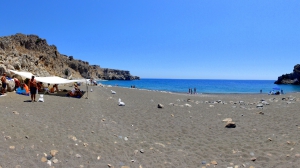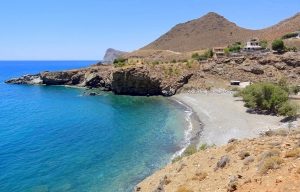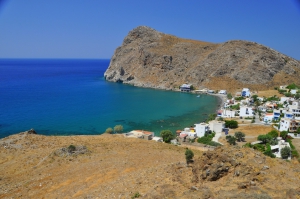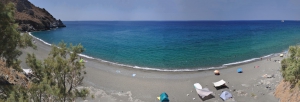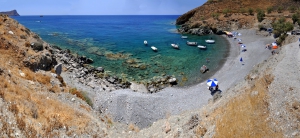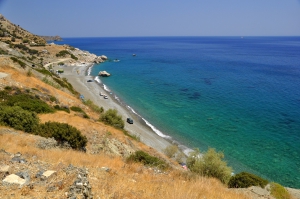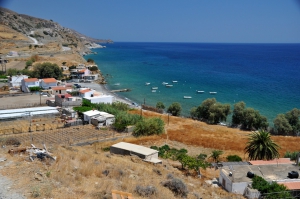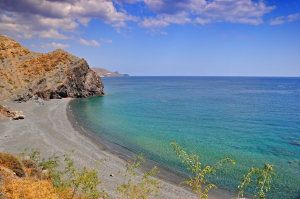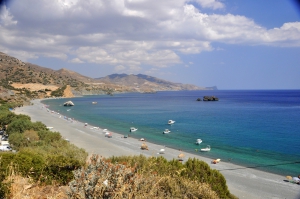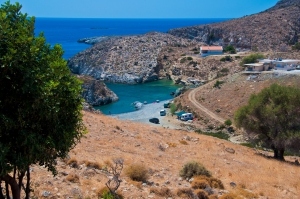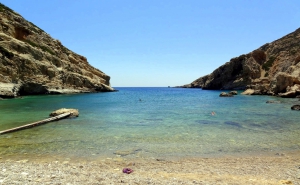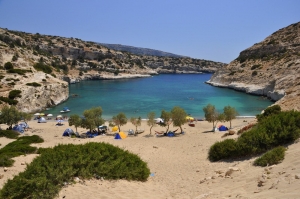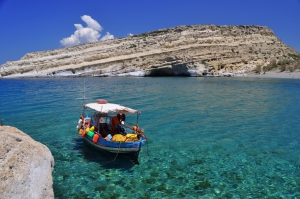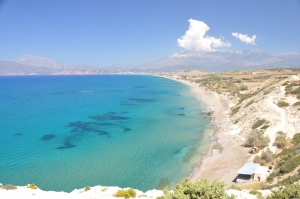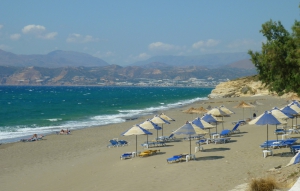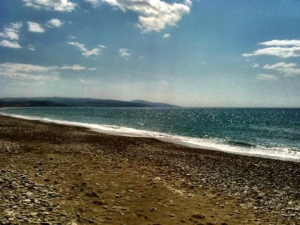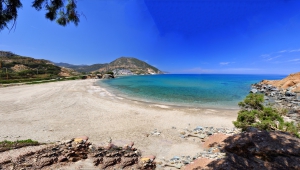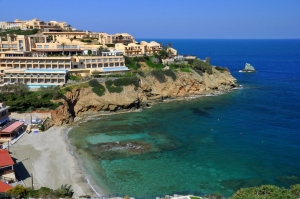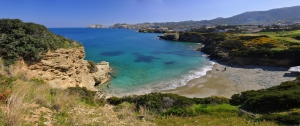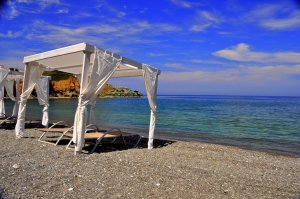Trafoulas or Dragon Bay is located 4km east of Lendas and 69km south of Heraklion. It is a completely isolated beach of south Crete, which is formed at the exit of a small canyon on the Cape Trafoulas or Trahilas. According to the legend, this beach was visited by King Minos and his men, while the neighbouring Loutra beach was the bathing beach of Minos's wife, Pasiphae, and her female followers.
Loutra (i.e. Baths) is located 3km east of the seaside village Lendas, 77km south of Heraklion. It is known to locals because it hosts the port of Lendas, which is protected by the Cape Trafoulas on the east.
Lendas is a remote coastal village located 74km south of Heraklion, on the southern slopes of the imposing Asterousia Mountains. It is a tourist resort and a port, mildly developed offering very relaxing holidays. Lendas can be accessed from Agii Deka, close to Mires town, via the village of Miamou, through a narrow paved road.
Dyskos is located 75km southwest of Heraklion, just 1-2km west of Lendas. It is a small settlement, known also as Dytikos, which is separated from the village of Lendas by the famous Cape Lion. Lion is said that was one of the lions carrying the chariot of the goddess Rhea and was petrified here.
West of Lendas you'll meet the small village of Tsigounas with the small beach of Limanaki (harbor) used as a local harbour, due to its protected orientation. Tsigounas name derives from the word tsigounis (stingy) referring to a local spring with a small quantity of water.
East of the village Platia Peramata you will firstly meet the longest beach of Platia Peramata, called Psili Ammos, which is totally isolated and very beautiful. The beach is not very suitable for camping, as there is no shade from trees. However, at the eastern end there are large white rocks, called Asproharaki, which offer shade to their lucky “occupiers”.
It is located at the exit of a small valley, a rare phenomenon in the wild Asterousia Mountains, which starts from the village Antiskari and ends in settlement. The fertile valley is used for growing early vegetables such as tomatoes, cucumbers, peppers, etc., since the temperature here is always high. Characteristic of the warm climate is that the swallows do not leave the area in winter.
About 1km east of Chrysostomos settlement we meet the amazing beaches of Maha. The first beach is rocky and is mainly used as harbor. It is unorganized but there are some rooms and a tavern nearby, from where a dirt road leads to the beach.
If you exclude the repelling landscape of tanks, you will certainly be enchanted by the beautiful beaches of Kali Limenes, which are suitable for swimming all year round. As its name name suggests, sea in Kali Limenes (i.e. Fair Harbors) is almost always calm, except in winter. This was one of the reasons for the construction of the tanks here. If you visit the place on weekend, all its beaches are crowded by thousands of people, despite the tiring route in Asterousia.
Stena is located 75km southwest of Heraklion, just 500m west of Kali Limenes harbor. It is situated in a secluded bay, which is hidden beyond the hill with the church and the cave of St. Paul. According to the legend, the Apostle lived inside this cave for 2 years. Stena can be accessed via a downhill dirt road, 400m long, starting in Kali Limenes. The route, of course, can be easily walked.
Martsalo is a secluded beach in the west Asterousia Mountains, one of the most inaccessible areas of Heraklion. It is located just a few kilometers from the “horn” of Messara Plain, the Cape Lithino, and 80km southwest of Heraklion.
The beach is shaped at the exit of a small gorge, surrounded by long cliffs. The circular bight of the bay conceals it from the open sea, making Vathy a natural hideout. It is no coincidence that pirates used it as their anchorage. The well-protected beach has almost always calm waters, although the surrounding beaches can be very wavy.
Matala is famous for the carved caves in the rocks and the hippies of the ‘70s. It is located close to Phaestus, the second-largest palace of the Minoan civilization. Matala was the port of Phaestus, and in the Roman Times, it became a port of Gortys.
Kommos (or Komos) is located 66km southwest of Heraklion, just 2km north of Matala and close the seaside settlement of Kalamaki. It is actually the southernmost and the most isolated part of the huge beachfront of Mesara Bay. Kommos was once the port of Phaestus, so you can still see the ruins of the town, near the beach. You can access Kommos by driving in the road heading to Matala, till you see a sign to Kommos.
Kalamaki is a small seaside village located 65km southwest of Heraklion, between Matala and Kokkinos Pirgos. The beach in front of the village is only a small part (2,5 km) of the vast seafront that stretches along the long Bay of Messara.
Kokkinos Pirgos (i.e. Red Tower) is located 67km west of Heraklion and close to the town of Tymbaki. The name is taken after the tower that was there and was built with reddish soil. The purpose of this tower at this point is still unknown. It is the seaside village of Timbaki, home of the port of the region and developed touristically.
Fodele beach is located 26km northwest of Heraklion and just 3km north of the village Fodele, which is believed to be the birthplace of the painter Domenikos Theotokopoulos, mainly known as El Greco. The National Road connecting Heraklion and Chania passes beside the beach.
Mononaftis is a beautiful pebbly beach, located 24km northwest of Heraklion and just 1km north of Agia Pelagia main beach. According to the tradition, a ship was sunk here once and only one sailor survived. This story gave the name Mononaftis to the beach, which means “One sailor”. However, Mononaftis is a huge rock floating just 50m off the coast.
Psaromoura is located 22km northwest of Heraklion, just 500m north of Agia Pelagia. Like all beaches in the area, it faces East and is sheltered from the north winds usually blowing in the area. Right on the beach there are no hotels or restaurants, but there many facilities within walking distance.










